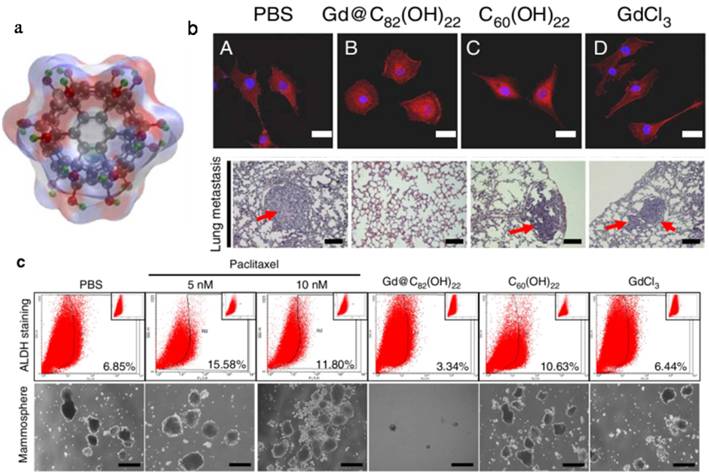The contemporary use of nanomedicines for cancer treatment has been largely limited to serving as carriers for existing therapeutic agents. Here, we provide definitive evidence that, the metallofullerenol nanomaterial Gd@C82(OH)22, while essentially not toxic to normal mammary epithelial cells, possesses intrinsic inhibitory activity against triple-negative breast cancer cells. Gd@C82(OH)22 blocks epithelial-to-mesenchymal transition with resultant efficient elimination of breast cancer stem cells (CSCs) resulting in abrogation of tumour initiation and metastasis. In normoxic conditions, Gd@C82(OH)22 mediates these effects by blocking TGF-b signalling. Moreover, under hypoxic conditions found in the tumour micro-environment, cellular uptake of Gd@C82(OH)22 is facilitated where it functions as a bi-potent inhibitor of HIF-1a and TGF-b activities, enhancing CSC elimination. These studies indicate that nanomaterials can be engineered to directly target CSCs. Thus, Gd-metallofullerenol is identified as a kind of non-toxic CSC specific inhibitors with significant therapeutic potential. 
(Ying Liu, Chunying Chen, Pengxu Qian, Xuefei Lu, Baoyun Sun, Xiao Zhang, Liming Wang, Xingfa Gao, Han Li, Zhiyun Chen, Jinglong Tang, Weijie Zhang, Jinquan Dong, Ru Bai, Peter E. Lobie, Qingfa Wu, Suling Liu, Huafeng Zhang, Feng Zhao, Max S. Wicha, Tao Zhu & Yuliang Zhao. Gd-metallofullerenol nanomaterial as non-toxic breast cancer stem cell-specific inhibitor. Nature Communications 2015, 6:5988.
DOI: 10.1038/ncomms6988|www.nature.com/naturecommunications) |

